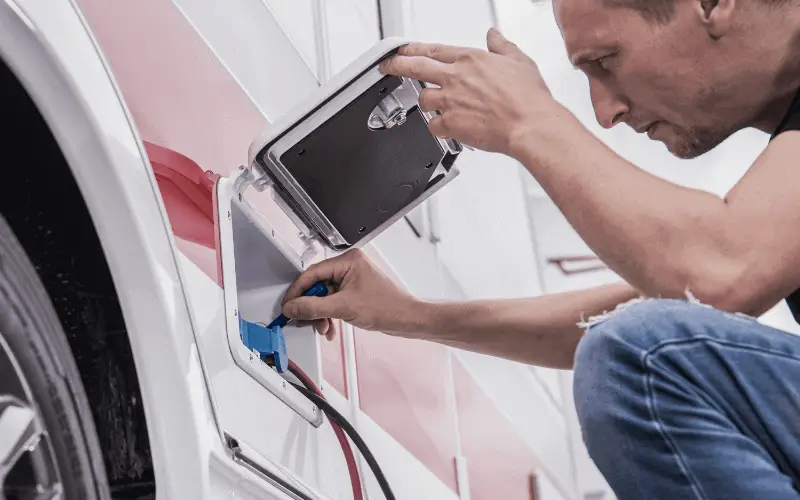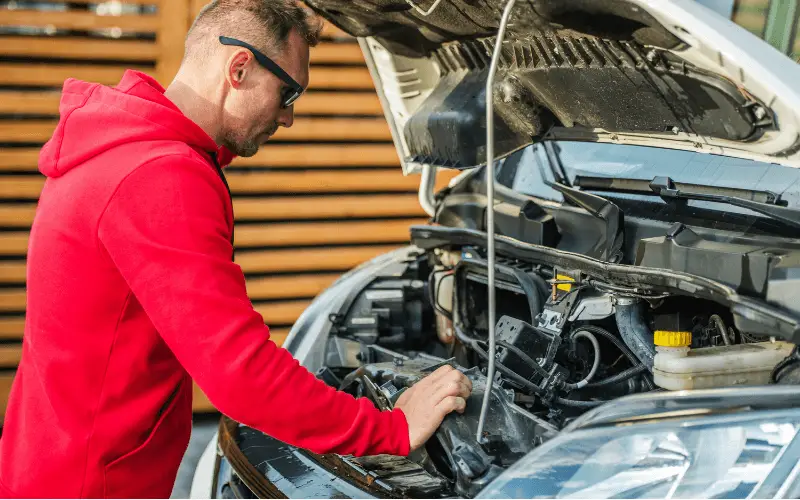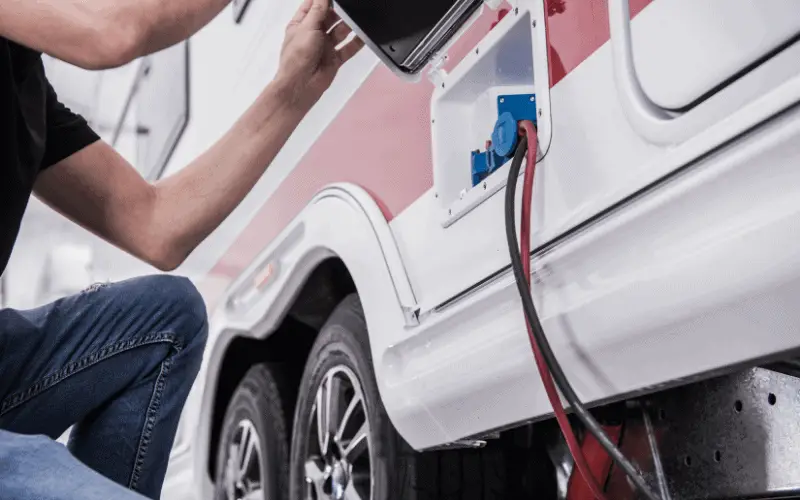Published Date: September 27, 2020
Last Updated on March 22, 2023 by Camper Front
Whether you have a new or used RV, it is bound to experience electrical problems at some point in time. The last thing you want is to have your RV’s electrical system pack up on you just as you get to your destination.
To prevent this, there are some steps you need to undertake to unravel some of the most common travel trailer electrical problems; the first step is gaining a general understanding of the electrical systems that power your RV.
Not only will this help you on the road, but this knowledge aid you in inspecting your RV before departing.
Table of Contents
Common Travel Trailer Electrical Problems
The best way to diagnose and avoid any RV electrical problem is to have a basic understanding of the three electrical systems present in your RV and learn how they work
Chassis 12 Volt System
This system’s power comes from the chassis batteries that power the exterior RV headlights, stop lights, and turn signals.
This current is directed through a 7-pin way connector that is attached to the trailer or tow vehicle. For most motorized RVs, the power is generated from Batteries that are connected to an alternator.
House 120-Volt System
You can already see the “house” stated in its name; this is a 120-volt AC (alternating current) system that is just like the one you have at home.
This system powers high-power electrical devices like your water heater, air conditioner, microwave, oven, electrical outlets on the walls, and all other accessories that require a 120-volt system to run.
This system runs on AC power, and the source of this power is generators or an electrical outlet in the campgrounds. It uses a power control panel that distributes the electricity to the 120V appliances and outlets in the RV.
RV 12-Volt System
Last but not least, we have the 12-volt system, it consists of deep cycle batteries from which it draws its power to run all of the 12-volt lights, the circuit board for all of the appliances, water pumps, slide-outs, propane detector, and leveling jacks.
To receive and maintain the charge in these batteries, the RV has a converter (also known as an inverter), just like a car that converts the 120 volts to 12 volts.
- Read Also: What You Can Run in a 5000 Watt Generator
Troubleshooting Your Travel Trailer Electrical Problems

There are four sections we are going to troubleshoot, and your problem should basically be coming from any of them.
- Fuses and breakers
- The 12-volt systems
- The power sources
- Appliance current draws
Troubleshooting Fuses and Breakers
This is the most common RV electrical problem, and most times, you may end up having to change the fuse, reset the breaker, or reset a Ground Fault Indicator. Depending on the model year of your RV, you might have a fuse if your RV is old, or a breaker if it is new.
Your breaker or fuse might malfunction even with no appliances or wire acting up. But a blown fuse or a tripped breaker usually indicates that something else in your RV isn’t working the way it should.
Like a sudden electrical surge or when an appliance runs in an unsafe mode, many appliances have sensors on their mechanical parts that trip a breaker or blow a fuse rather than allow the appliance to continue working in an unsafe mode.
You should also note that breakers can go bad themselves if they trip too many times, it causes them to suffer mechanical stress and lose their ability to stay closed at the current they were designed for.
When you try to fix your fuse or breaker, it is highly advised that you don’t seek a high-rated one. This is because Each electrical device was installed on an electrical line that could safely handle the load.
So Putting in a higher-rated fuse or breaker could cause an electrical fire, which can cause significant damage to your RV, or You could permanently damage the equipment that is being powered by that fuse.
Below is a table of fuse colors and what ratings they indicate, in case you are trying to find the right fuse.

Troubleshooting 12-Volt System Problems
A problem with the 12-volt system can result in the failure of every other appliance dependent on it.
Your refrigerator and air conditioner, even though they may be running on propane-fueled mode or AC power, they still require DC voltage for their logic circuits, so they may stop running when there is a DC system problem.
There are many reasons why your 12-volt system could be malfunctioning; one of them could be an undercharged battery or inadequate water level in the batteries, or you have a blown fuse or tripped breaker. There are some simple investigations you can carry out yourself to diagnose the problem;
- Check to see if the fuse or breaker is tripped.
- Check whether the fuse is loose.
- Check the connections to the fuse or breaker box and see if they are loose.
- Check the connections to the DC batteries and see if they are loose.
- Check whether the batteries have enough water because when your battery is overworked or overheated, the water tends to evaporate; if this is the problem, you can go ahead and add some distilled water.
- Check if the batteries have enough charge. You can use a multimeter to check the level of charge, and when you do, it should show the voltage between the battery terminals between 13.4 and 14.5 volts DC. If it doesn’t, then the battery may be worn out and need replacement, or it may be experiencing water shortage, or the converter may not be giving it any power.
- Check to see if the connections to the converter are loose.
- Lastly, check the fuse on the converter. Sometimes, The converter itself has a fuse or two on the front.
If, after carrying out all the checkups and you still can find anything wrong, then it’s highly likely that your converter is bad, you will need a seasoned mechanic to handle this.
Troubleshooting Outside Power Sources
If you are parked at a campsite or any place with a power outlet, this may also cause some electrical problems. If The power supply that your parked RV is plugged into is supplying too much or too little power, fluctuates frequently, is not grounded properly, or its connector is corroded.
This may cause a lot of problems for your electrical components. Too much current can cause your appliances or lights to blow out; it can even melt your wires; when the current is low, your appliances will not run properly.
If you are experiencing all this at your campsite, you should quickly alert the campsite management as it is their responsibility to ensure the supply of uninterrupted power at the correct amount.
You can also purchase a surge protector to save you the stress of current fluctuations, but ensure you purchase a high-quality device that curbs the voltage spikes efficiently.
Although most Motorhomes tend to have surge protection facilities put in place, an RV surge protection is still a better option as they offer quicker reaction time to voltage changes than a regular breaker. A few seconds difference is very crucial when it comes to electric power.
Troubleshooting AC Current Draws
You should not try to fix any issues arising from your RV’s 115-volt power system if you are not a professional electrician. But if your AC breakers or fuses are going off, you can try to find out if your appliances are drawing more AC power than is being supplied.
You also have to keep in mind that most problems that you may have with your AC appliances may not be from your 115-volt system but your 12-volt system. This is because the controls for your fridge and your air conditioner and heater and other appliance switches are likely 12-volt.
RV Electrical Safety Warnings

Before you try to handle any electrical problem, you have to make sure they are minor problems like changing fuses, resetting breakers, or refilling a battery’s water level.
Anything that involves electrical repairs can pose a significant risk of damaging the rig and self-injury if you have little or no knowledge about them, so you have to make sure to hire a professional electrician.
When carrying out some simple repairs, you should be cautious and follow safety procedures; here are some basic safety measures;
- If, after changing a fuse or resetting a breaker, the problem persists, do not touch anything else and call for the help of electrical service.
- Before plugging your RV into a campsite’s electrical pedestal, make sure to check the power source first; you can also use a voltmeter or power management device to find out if there’s an issue with the power source.
- Before turning off the main power, ensure that all your appliances are properly turned off. As sudden, unplugging of power may cause damage to your appliances, and after carrying out necessary repairs and turning on the main power source, do not switch on all your appliances at once, doing so may cause a fuse or two to blow or even trip the breaker.
- Never use your air conditioner on a 15-amp outlet, even if you are using an adapter, it will damage your wiring.
Conclusion
With proper maintenance of your RV, the most common travel trailer electrical problems you will experience will be minor.
But knowing the problem itself is what could pose a problem, especially if you have no prior knowledge about the electrical system in the first place. If you are a “newbie” or scared of electricity like me, you should always seek professional help, stay safe!

